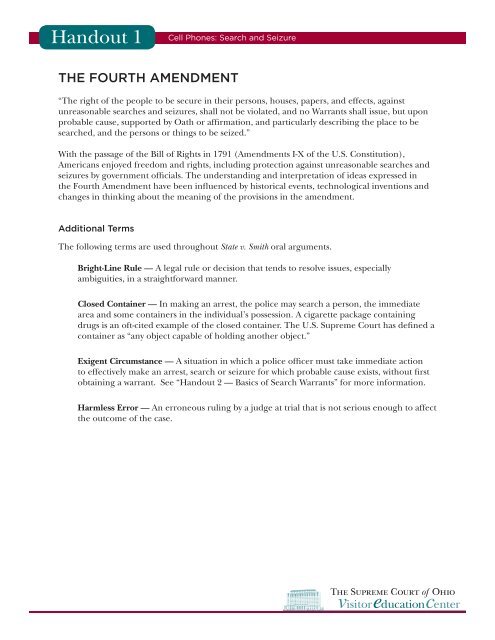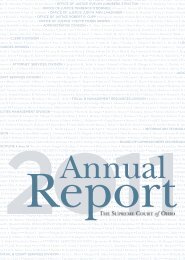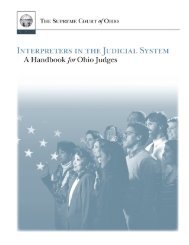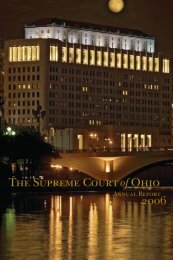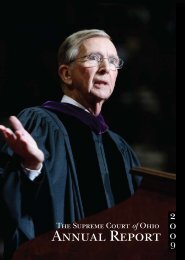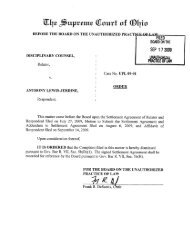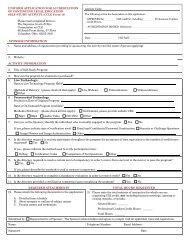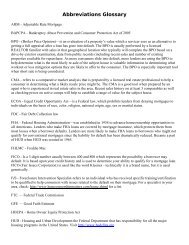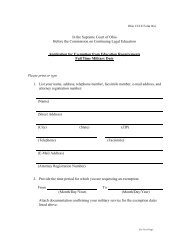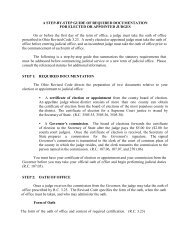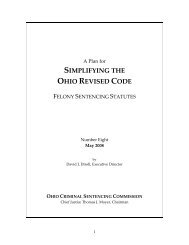cell phones: search and seizure - Supreme Court - State of Ohio
cell phones: search and seizure - Supreme Court - State of Ohio
cell phones: search and seizure - Supreme Court - State of Ohio
Create successful ePaper yourself
Turn your PDF publications into a flip-book with our unique Google optimized e-Paper software.
H<strong>and</strong>out 1<br />
Cell Phones: Search <strong>and</strong> Seizure<br />
THE FOURTH AMENDMENT<br />
“The right <strong>of</strong> the people to be secure in their persons, houses, papers, <strong>and</strong> effects, against<br />
unreasonable <strong>search</strong>es <strong>and</strong> <strong>seizure</strong>s, shall not be violated, <strong>and</strong> no Warrants shall issue, but upon<br />
probable cause, supported by Oath or affirmation, <strong>and</strong> particularly describing the place to be<br />
<strong>search</strong>ed, <strong>and</strong> the persons or things to be seized.”<br />
With the passage <strong>of</strong> the Bill <strong>of</strong> Rights in 1791 (Amendments I-X <strong>of</strong> the U.S. Constitution),<br />
Americans enjoyed freedom <strong>and</strong> rights, including protection against unreasonable <strong>search</strong>es <strong>and</strong><br />
<strong>seizure</strong>s by government <strong>of</strong>ficials. The underst<strong>and</strong>ing <strong>and</strong> interpretation <strong>of</strong> ideas expressed in<br />
the Fourth Amendment have been influenced by historical events, technological inventions <strong>and</strong><br />
changes in thinking about the meaning <strong>of</strong> the provisions in the amendment.<br />
Additional Terms<br />
The following terms are used throughout <strong>State</strong> v. Smith oral arguments.<br />
Bright-Line Rule — A legal rule or decision that tends to resolve issues, especially<br />
ambiguities, in a straightforward manner.<br />
Closed Container — In making an arrest, the police may <strong>search</strong> a person, the immediate<br />
area <strong>and</strong> some containers in the individual’s possession. A cigarette package containing<br />
drugs is an <strong>of</strong>t-cited example <strong>of</strong> the closed container. The U.S. <strong>Supreme</strong> <strong>Court</strong> has defined a<br />
container as “any object capable <strong>of</strong> holding another object.”<br />
Exigent Circumstance — A situation in which a police <strong>of</strong>ficer must take immediate action<br />
to effectively make an arrest, <strong>search</strong> or <strong>seizure</strong> for which probable cause exists, without first<br />
obtaining a warrant. See “H<strong>and</strong>out 2 — Basics <strong>of</strong> Search Warrants” for more information.<br />
Harmless Error — An erroneous ruling by a judge at trial that is not serious enough to affect<br />
the outcome <strong>of</strong> the case.


